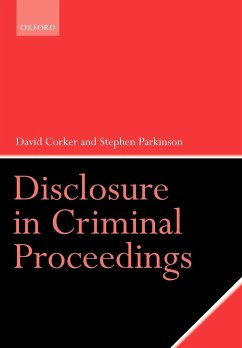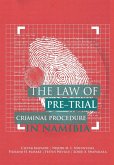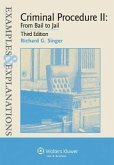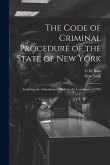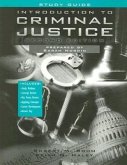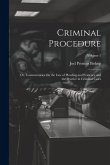- Broschiertes Buch
- Merkliste
- Auf die Merkliste
- Bewerten Bewerten
- Teilen
- Produkt teilen
- Produkterinnerung
- Produkterinnerung
The only up-to-date book to deal with disclosure of material in criminal proceedings.This book follows chronologically the progress of a case from the outset of an investigation until its conclusion, addressing the obligations and responsibilities of each of the parties as they arise.The text analyses all the relevant law and procedure.
Andere Kunden interessierten sich auch für
![Censure and Sanctions Censure and Sanctions]() Hirsch VonCensure and Sanctions147,99 €
Hirsch VonCensure and Sanctions147,99 €![The Law of Pre-Trial Criminal Procedure in Namibia The Law of Pre-Trial Criminal Procedure in Namibia]() Clever MapaureThe Law of Pre-Trial Criminal Procedure in Namibia70,99 €
Clever MapaureThe Law of Pre-Trial Criminal Procedure in Namibia70,99 €![Criminal Procedure II: From Bail to Jail Criminal Procedure II: From Bail to Jail]() Richard G. SingerCriminal Procedure II: From Bail to Jail67,99 €
Richard G. SingerCriminal Procedure II: From Bail to Jail67,99 €![A Criminal Justice Handbook A Criminal Justice Handbook]() J B SimmsA Criminal Justice Handbook23,99 €
J B SimmsA Criminal Justice Handbook23,99 €![The Code of Criminal Procedure of the State of New York: Including the Amendments Made by the Legislature of 1902 The Code of Criminal Procedure of the State of New York: Including the Amendments Made by the Legislature of 1902]() New YorkThe Code of Criminal Procedure of the State of New York: Including the Amendments Made by the Legislature of 190233,99 €
New YorkThe Code of Criminal Procedure of the State of New York: Including the Amendments Made by the Legislature of 190233,99 €![Introduction to Criminal Justice Introduction to Criminal Justice]() Robert M. BohmIntroduction to Criminal Justice49,99 €
Robert M. BohmIntroduction to Criminal Justice49,99 €![Criminal Procedure; Or, Commentaries On the Law of Pleading and Evidence and the Practice in Criminal Cases; Volume 1 Criminal Procedure; Or, Commentaries On the Law of Pleading and Evidence and the Practice in Criminal Cases; Volume 1]() Joel Prentiss BishopCriminal Procedure; Or, Commentaries On the Law of Pleading and Evidence and the Practice in Criminal Cases; Volume 139,99 €
Joel Prentiss BishopCriminal Procedure; Or, Commentaries On the Law of Pleading and Evidence and the Practice in Criminal Cases; Volume 139,99 €-
-
-
The only up-to-date book to deal with disclosure of material in criminal proceedings.This book follows chronologically the progress of a case from the outset of an investigation until its conclusion, addressing the obligations and responsibilities of each of the parties as they arise.The text analyses all the relevant law and procedure.
Hinweis: Dieser Artikel kann nur an eine deutsche Lieferadresse ausgeliefert werden.
Hinweis: Dieser Artikel kann nur an eine deutsche Lieferadresse ausgeliefert werden.
Produktdetails
- Produktdetails
- Verlag: OUP Oxford
- Seitenzahl: 376
- Erscheinungstermin: 29. Januar 2009
- Englisch
- Abmessung: 244mm x 170mm x 20mm
- Gewicht: 648g
- ISBN-13: 9780199211340
- ISBN-10: 0199211345
- Artikelnr.: 23089745
- Herstellerkennzeichnung
- Libri GmbH
- Europaallee 1
- 36244 Bad Hersfeld
- gpsr@libri.de
- Verlag: OUP Oxford
- Seitenzahl: 376
- Erscheinungstermin: 29. Januar 2009
- Englisch
- Abmessung: 244mm x 170mm x 20mm
- Gewicht: 648g
- ISBN-13: 9780199211340
- ISBN-10: 0199211345
- Artikelnr.: 23089745
- Herstellerkennzeichnung
- Libri GmbH
- Europaallee 1
- 36244 Bad Hersfeld
- gpsr@libri.de
David Corker is a founding partner of Corker Binning solicitors. He is regarded as a market leader in fraud and business crime. The 2003-2004 Chambers Guide to the Legal Profession described him having a "pedigree which stands out by itself. " The 2005 edition then later described him as "tremendously bright". Prior to founding Corker Binning, David was a partner at Peters & Peters which he joined in 1990. He was a Constable in the Metropolitan Police from 1984 to 1987. David is the author of two criminal law textbooks on Disclosure and Abuse of Process and writes regularly for the national and legal press. David has a BA in Jurisprudence from Oxford University and an MA in Sociology of Law from Sheffield University. Stephen Parkinson is a Senior Partner at Kingsley Napley, and has a high profile practice involving white collar crime, regulatory litigation and public inquiry work. Prior to joining Kingley Napley in 2003, Stephen was the chief adviser to the Attorney General and the Solicitor General on all their responsibilities for criminal issues. Stephen also spent four and a half years as the Legal Adviser to the Companies Investigation Branches of the Department of Trade and Industry, and two years in charge of chancery and regulatory litigation at the Treasury Solicitor's Department.
* 1: Evolution of the Law on Disclosure of Unused Material
* Introduction
* Developments from 1946 to 1981
* The Rise and Fall of the Attorney-General's Guidelines 1981-1992
* The New Common Law Disclosure Regime 1993-1997
* The CPIA 1997-2003
* 2: Sources
* Introduction
* Statutory Sources
* Non-Statutory Sources
* 3: Pre-Interview Disclosure
* Introduction
* Disclosure by Interviewers Prior to an Interview under Caution
* Disclosure by Interviewers Prior to a Compulsory Interview
* 4: The Investigation Stage
* Introduction
* Criminal Investigations and the CPIA Code of Practice
* Other Relevant Legal Sources
* Roles Created by the Code
* Prime Police Responsibilities Created by the Code and the Disclosure
Manual
* Prosecutors' Review of the Work of the Disclosure Officer
* 5: Disclosure of the Prosecution Case
* Introduction
* Disclosure of Evidence, Natural Justice, and the Rule of Law
* Disclosure in the Magistrates' Court
* Disclosure in the Crown Court
* 6: Disclosure of Unused Material in Summary Proceedings
* Introduction
* The Magistrates' Courts Disclosure Protocol
* No Duty of Disclosure until Not Guilty Plea Entered
* Voluntary Defence Disclosure
* No Power to Order Disclosure of Defence Statements amongst Co-accused
* Prosecution Continuing Duty of Disclosure
* Application by Defence for Specific Disclosure
* Adverse Inferences at Summary Trial
* When does the Prosecutor's Initial Duty Commence?
* Common Law Duty of Disclosure
* 7: Prosecution Duty to Disclose Unused Material
* The Test for Disclosure: Section 3
* Guidance as to Carrying out the Prosecutor's Duty
* Guidance as to Types of Material that should be Considered for
Disclosure
* The Role of the Court in Considering the Application of the
Prosecutor's Duty
* Disclosure of the Non-sensitive Schedule (Form MG6C): Section 4
* The Prosecutor's Continuing Duty to Disclose: Section 7A
* Responding to Defence Statements
* 8: Defence Disclosure: Sections 5 and 6
* Background to the Current Defence Disclosure Regime
* Summary of Amendments to the CPIA Made by the CJA 2003
* Section 6A(1): The Mandatory Content of a Defence Statement
* Sections 6A(2) and (3): Defence Statements and Alibi
* Section 6B: Updated Defence Disclosure
* Section 6C: Pre-trial Disclosure of Defence Witnesses
* Section 6E(1): Defence Statement and Authority of the Accused
* Section 6E(4) and (5): Admissibility of a Defence Statement
* Sections (5A)-(5D): Disclosure of Defence Statement amongst
Co-accused and others
* Timing of Service of the Defence Statement
* Can the Defence Lawyer Properly Advise their Client, the Accused, not
to Comply with their Disclosure Obligations under Section 6A?
* Section 8: Application by Defence for Specific Disclosure
* 9: Public Interest Immunity
* Introduction
* Development of the Doctrine of Public Interest Immunity
* The Strasbourg Jurisprudence
* The Ruling in H and C: the Modern Approach of the Courts to
Determining Public Interest Immunity Applications
* Recognized Public Interest Grounds
* Practice and Procedure
* Special Advocates
* Intercept Material
* 10: Expert Evidence
* Introduction
* Expert Evidence in Criminal Proceedings - Content and Process -
Criminal Procedure Rules 2005, Part 33
* Disclosure of Expert Evidence - Criminal Procedure Rules 2005, Part
24
* Experts' Evidence and Unused Material
* Legal Professional Privilege and Experts' Reports
* Notification of Names of Experts Instructed by the Defendant
* 11: Third Party Disclosure
* Introduction
* Obligations of Investigators and Prosecutors
* Voluntary Disclosure Route
* Compulsory Route
* 12: Trial Dislcosure
* Section 11 of the CPIA
* Credibility of Defence Witnesses
* The Identity of Prosecution Witnesses
* 13: Disclosure and the Court of Appeal
* Introduction
* The Criminal Appeal Act 1968
* Safety and Fairness
* Duty of Disclosure and Appeals
* Wrongful Non-Disclosure Appeals
* Non-Disclosure and Abuse of Process
* Late Prosecution Disclosure
* Non-Disclosure and Sentence
* APPENDIX 1: Criminal Procedure and Investigations Act 1996 (c.25)
* APPENDIX 2: Criminal Procedure and Investigations Act 1996 (s. 23(1))
Code of Practice
* APPENDIX 3: Disclosure: A Protocol for the Control and Management of
Unused Material in the Crown Court
* APPENDIX 4: Protocol for the Provision of Advance Information,
Prosecution Evidence and Disclosure of Unused Material in the
Magistrates' Courts
* APPENDIX 5: The Protocol for the Control and Management of Heavy
Fraud and Other Complex Cases
* APPENDIX 6: The Criminal Procedure and Investigations Act 1996
(Defence Disclosure Time Limits) Regulations 1997 Statutory
Instrument 1997 No. 2680
* APPENDIX 7: Attorney-General's Guidelines on Disclosure
* APPENDIX 8: Criminal Procedure Rules Parts 21 and 25
* Introduction
* Developments from 1946 to 1981
* The Rise and Fall of the Attorney-General's Guidelines 1981-1992
* The New Common Law Disclosure Regime 1993-1997
* The CPIA 1997-2003
* 2: Sources
* Introduction
* Statutory Sources
* Non-Statutory Sources
* 3: Pre-Interview Disclosure
* Introduction
* Disclosure by Interviewers Prior to an Interview under Caution
* Disclosure by Interviewers Prior to a Compulsory Interview
* 4: The Investigation Stage
* Introduction
* Criminal Investigations and the CPIA Code of Practice
* Other Relevant Legal Sources
* Roles Created by the Code
* Prime Police Responsibilities Created by the Code and the Disclosure
Manual
* Prosecutors' Review of the Work of the Disclosure Officer
* 5: Disclosure of the Prosecution Case
* Introduction
* Disclosure of Evidence, Natural Justice, and the Rule of Law
* Disclosure in the Magistrates' Court
* Disclosure in the Crown Court
* 6: Disclosure of Unused Material in Summary Proceedings
* Introduction
* The Magistrates' Courts Disclosure Protocol
* No Duty of Disclosure until Not Guilty Plea Entered
* Voluntary Defence Disclosure
* No Power to Order Disclosure of Defence Statements amongst Co-accused
* Prosecution Continuing Duty of Disclosure
* Application by Defence for Specific Disclosure
* Adverse Inferences at Summary Trial
* When does the Prosecutor's Initial Duty Commence?
* Common Law Duty of Disclosure
* 7: Prosecution Duty to Disclose Unused Material
* The Test for Disclosure: Section 3
* Guidance as to Carrying out the Prosecutor's Duty
* Guidance as to Types of Material that should be Considered for
Disclosure
* The Role of the Court in Considering the Application of the
Prosecutor's Duty
* Disclosure of the Non-sensitive Schedule (Form MG6C): Section 4
* The Prosecutor's Continuing Duty to Disclose: Section 7A
* Responding to Defence Statements
* 8: Defence Disclosure: Sections 5 and 6
* Background to the Current Defence Disclosure Regime
* Summary of Amendments to the CPIA Made by the CJA 2003
* Section 6A(1): The Mandatory Content of a Defence Statement
* Sections 6A(2) and (3): Defence Statements and Alibi
* Section 6B: Updated Defence Disclosure
* Section 6C: Pre-trial Disclosure of Defence Witnesses
* Section 6E(1): Defence Statement and Authority of the Accused
* Section 6E(4) and (5): Admissibility of a Defence Statement
* Sections (5A)-(5D): Disclosure of Defence Statement amongst
Co-accused and others
* Timing of Service of the Defence Statement
* Can the Defence Lawyer Properly Advise their Client, the Accused, not
to Comply with their Disclosure Obligations under Section 6A?
* Section 8: Application by Defence for Specific Disclosure
* 9: Public Interest Immunity
* Introduction
* Development of the Doctrine of Public Interest Immunity
* The Strasbourg Jurisprudence
* The Ruling in H and C: the Modern Approach of the Courts to
Determining Public Interest Immunity Applications
* Recognized Public Interest Grounds
* Practice and Procedure
* Special Advocates
* Intercept Material
* 10: Expert Evidence
* Introduction
* Expert Evidence in Criminal Proceedings - Content and Process -
Criminal Procedure Rules 2005, Part 33
* Disclosure of Expert Evidence - Criminal Procedure Rules 2005, Part
24
* Experts' Evidence and Unused Material
* Legal Professional Privilege and Experts' Reports
* Notification of Names of Experts Instructed by the Defendant
* 11: Third Party Disclosure
* Introduction
* Obligations of Investigators and Prosecutors
* Voluntary Disclosure Route
* Compulsory Route
* 12: Trial Dislcosure
* Section 11 of the CPIA
* Credibility of Defence Witnesses
* The Identity of Prosecution Witnesses
* 13: Disclosure and the Court of Appeal
* Introduction
* The Criminal Appeal Act 1968
* Safety and Fairness
* Duty of Disclosure and Appeals
* Wrongful Non-Disclosure Appeals
* Non-Disclosure and Abuse of Process
* Late Prosecution Disclosure
* Non-Disclosure and Sentence
* APPENDIX 1: Criminal Procedure and Investigations Act 1996 (c.25)
* APPENDIX 2: Criminal Procedure and Investigations Act 1996 (s. 23(1))
Code of Practice
* APPENDIX 3: Disclosure: A Protocol for the Control and Management of
Unused Material in the Crown Court
* APPENDIX 4: Protocol for the Provision of Advance Information,
Prosecution Evidence and Disclosure of Unused Material in the
Magistrates' Courts
* APPENDIX 5: The Protocol for the Control and Management of Heavy
Fraud and Other Complex Cases
* APPENDIX 6: The Criminal Procedure and Investigations Act 1996
(Defence Disclosure Time Limits) Regulations 1997 Statutory
Instrument 1997 No. 2680
* APPENDIX 7: Attorney-General's Guidelines on Disclosure
* APPENDIX 8: Criminal Procedure Rules Parts 21 and 25
* 1: Evolution of the Law on Disclosure of Unused Material
* Introduction
* Developments from 1946 to 1981
* The Rise and Fall of the Attorney-General's Guidelines 1981-1992
* The New Common Law Disclosure Regime 1993-1997
* The CPIA 1997-2003
* 2: Sources
* Introduction
* Statutory Sources
* Non-Statutory Sources
* 3: Pre-Interview Disclosure
* Introduction
* Disclosure by Interviewers Prior to an Interview under Caution
* Disclosure by Interviewers Prior to a Compulsory Interview
* 4: The Investigation Stage
* Introduction
* Criminal Investigations and the CPIA Code of Practice
* Other Relevant Legal Sources
* Roles Created by the Code
* Prime Police Responsibilities Created by the Code and the Disclosure
Manual
* Prosecutors' Review of the Work of the Disclosure Officer
* 5: Disclosure of the Prosecution Case
* Introduction
* Disclosure of Evidence, Natural Justice, and the Rule of Law
* Disclosure in the Magistrates' Court
* Disclosure in the Crown Court
* 6: Disclosure of Unused Material in Summary Proceedings
* Introduction
* The Magistrates' Courts Disclosure Protocol
* No Duty of Disclosure until Not Guilty Plea Entered
* Voluntary Defence Disclosure
* No Power to Order Disclosure of Defence Statements amongst Co-accused
* Prosecution Continuing Duty of Disclosure
* Application by Defence for Specific Disclosure
* Adverse Inferences at Summary Trial
* When does the Prosecutor's Initial Duty Commence?
* Common Law Duty of Disclosure
* 7: Prosecution Duty to Disclose Unused Material
* The Test for Disclosure: Section 3
* Guidance as to Carrying out the Prosecutor's Duty
* Guidance as to Types of Material that should be Considered for
Disclosure
* The Role of the Court in Considering the Application of the
Prosecutor's Duty
* Disclosure of the Non-sensitive Schedule (Form MG6C): Section 4
* The Prosecutor's Continuing Duty to Disclose: Section 7A
* Responding to Defence Statements
* 8: Defence Disclosure: Sections 5 and 6
* Background to the Current Defence Disclosure Regime
* Summary of Amendments to the CPIA Made by the CJA 2003
* Section 6A(1): The Mandatory Content of a Defence Statement
* Sections 6A(2) and (3): Defence Statements and Alibi
* Section 6B: Updated Defence Disclosure
* Section 6C: Pre-trial Disclosure of Defence Witnesses
* Section 6E(1): Defence Statement and Authority of the Accused
* Section 6E(4) and (5): Admissibility of a Defence Statement
* Sections (5A)-(5D): Disclosure of Defence Statement amongst
Co-accused and others
* Timing of Service of the Defence Statement
* Can the Defence Lawyer Properly Advise their Client, the Accused, not
to Comply with their Disclosure Obligations under Section 6A?
* Section 8: Application by Defence for Specific Disclosure
* 9: Public Interest Immunity
* Introduction
* Development of the Doctrine of Public Interest Immunity
* The Strasbourg Jurisprudence
* The Ruling in H and C: the Modern Approach of the Courts to
Determining Public Interest Immunity Applications
* Recognized Public Interest Grounds
* Practice and Procedure
* Special Advocates
* Intercept Material
* 10: Expert Evidence
* Introduction
* Expert Evidence in Criminal Proceedings - Content and Process -
Criminal Procedure Rules 2005, Part 33
* Disclosure of Expert Evidence - Criminal Procedure Rules 2005, Part
24
* Experts' Evidence and Unused Material
* Legal Professional Privilege and Experts' Reports
* Notification of Names of Experts Instructed by the Defendant
* 11: Third Party Disclosure
* Introduction
* Obligations of Investigators and Prosecutors
* Voluntary Disclosure Route
* Compulsory Route
* 12: Trial Dislcosure
* Section 11 of the CPIA
* Credibility of Defence Witnesses
* The Identity of Prosecution Witnesses
* 13: Disclosure and the Court of Appeal
* Introduction
* The Criminal Appeal Act 1968
* Safety and Fairness
* Duty of Disclosure and Appeals
* Wrongful Non-Disclosure Appeals
* Non-Disclosure and Abuse of Process
* Late Prosecution Disclosure
* Non-Disclosure and Sentence
* APPENDIX 1: Criminal Procedure and Investigations Act 1996 (c.25)
* APPENDIX 2: Criminal Procedure and Investigations Act 1996 (s. 23(1))
Code of Practice
* APPENDIX 3: Disclosure: A Protocol for the Control and Management of
Unused Material in the Crown Court
* APPENDIX 4: Protocol for the Provision of Advance Information,
Prosecution Evidence and Disclosure of Unused Material in the
Magistrates' Courts
* APPENDIX 5: The Protocol for the Control and Management of Heavy
Fraud and Other Complex Cases
* APPENDIX 6: The Criminal Procedure and Investigations Act 1996
(Defence Disclosure Time Limits) Regulations 1997 Statutory
Instrument 1997 No. 2680
* APPENDIX 7: Attorney-General's Guidelines on Disclosure
* APPENDIX 8: Criminal Procedure Rules Parts 21 and 25
* Introduction
* Developments from 1946 to 1981
* The Rise and Fall of the Attorney-General's Guidelines 1981-1992
* The New Common Law Disclosure Regime 1993-1997
* The CPIA 1997-2003
* 2: Sources
* Introduction
* Statutory Sources
* Non-Statutory Sources
* 3: Pre-Interview Disclosure
* Introduction
* Disclosure by Interviewers Prior to an Interview under Caution
* Disclosure by Interviewers Prior to a Compulsory Interview
* 4: The Investigation Stage
* Introduction
* Criminal Investigations and the CPIA Code of Practice
* Other Relevant Legal Sources
* Roles Created by the Code
* Prime Police Responsibilities Created by the Code and the Disclosure
Manual
* Prosecutors' Review of the Work of the Disclosure Officer
* 5: Disclosure of the Prosecution Case
* Introduction
* Disclosure of Evidence, Natural Justice, and the Rule of Law
* Disclosure in the Magistrates' Court
* Disclosure in the Crown Court
* 6: Disclosure of Unused Material in Summary Proceedings
* Introduction
* The Magistrates' Courts Disclosure Protocol
* No Duty of Disclosure until Not Guilty Plea Entered
* Voluntary Defence Disclosure
* No Power to Order Disclosure of Defence Statements amongst Co-accused
* Prosecution Continuing Duty of Disclosure
* Application by Defence for Specific Disclosure
* Adverse Inferences at Summary Trial
* When does the Prosecutor's Initial Duty Commence?
* Common Law Duty of Disclosure
* 7: Prosecution Duty to Disclose Unused Material
* The Test for Disclosure: Section 3
* Guidance as to Carrying out the Prosecutor's Duty
* Guidance as to Types of Material that should be Considered for
Disclosure
* The Role of the Court in Considering the Application of the
Prosecutor's Duty
* Disclosure of the Non-sensitive Schedule (Form MG6C): Section 4
* The Prosecutor's Continuing Duty to Disclose: Section 7A
* Responding to Defence Statements
* 8: Defence Disclosure: Sections 5 and 6
* Background to the Current Defence Disclosure Regime
* Summary of Amendments to the CPIA Made by the CJA 2003
* Section 6A(1): The Mandatory Content of a Defence Statement
* Sections 6A(2) and (3): Defence Statements and Alibi
* Section 6B: Updated Defence Disclosure
* Section 6C: Pre-trial Disclosure of Defence Witnesses
* Section 6E(1): Defence Statement and Authority of the Accused
* Section 6E(4) and (5): Admissibility of a Defence Statement
* Sections (5A)-(5D): Disclosure of Defence Statement amongst
Co-accused and others
* Timing of Service of the Defence Statement
* Can the Defence Lawyer Properly Advise their Client, the Accused, not
to Comply with their Disclosure Obligations under Section 6A?
* Section 8: Application by Defence for Specific Disclosure
* 9: Public Interest Immunity
* Introduction
* Development of the Doctrine of Public Interest Immunity
* The Strasbourg Jurisprudence
* The Ruling in H and C: the Modern Approach of the Courts to
Determining Public Interest Immunity Applications
* Recognized Public Interest Grounds
* Practice and Procedure
* Special Advocates
* Intercept Material
* 10: Expert Evidence
* Introduction
* Expert Evidence in Criminal Proceedings - Content and Process -
Criminal Procedure Rules 2005, Part 33
* Disclosure of Expert Evidence - Criminal Procedure Rules 2005, Part
24
* Experts' Evidence and Unused Material
* Legal Professional Privilege and Experts' Reports
* Notification of Names of Experts Instructed by the Defendant
* 11: Third Party Disclosure
* Introduction
* Obligations of Investigators and Prosecutors
* Voluntary Disclosure Route
* Compulsory Route
* 12: Trial Dislcosure
* Section 11 of the CPIA
* Credibility of Defence Witnesses
* The Identity of Prosecution Witnesses
* 13: Disclosure and the Court of Appeal
* Introduction
* The Criminal Appeal Act 1968
* Safety and Fairness
* Duty of Disclosure and Appeals
* Wrongful Non-Disclosure Appeals
* Non-Disclosure and Abuse of Process
* Late Prosecution Disclosure
* Non-Disclosure and Sentence
* APPENDIX 1: Criminal Procedure and Investigations Act 1996 (c.25)
* APPENDIX 2: Criminal Procedure and Investigations Act 1996 (s. 23(1))
Code of Practice
* APPENDIX 3: Disclosure: A Protocol for the Control and Management of
Unused Material in the Crown Court
* APPENDIX 4: Protocol for the Provision of Advance Information,
Prosecution Evidence and Disclosure of Unused Material in the
Magistrates' Courts
* APPENDIX 5: The Protocol for the Control and Management of Heavy
Fraud and Other Complex Cases
* APPENDIX 6: The Criminal Procedure and Investigations Act 1996
(Defence Disclosure Time Limits) Regulations 1997 Statutory
Instrument 1997 No. 2680
* APPENDIX 7: Attorney-General's Guidelines on Disclosure
* APPENDIX 8: Criminal Procedure Rules Parts 21 and 25

